Dog Peed in Car: How To Deal with Unfortunate Accidents
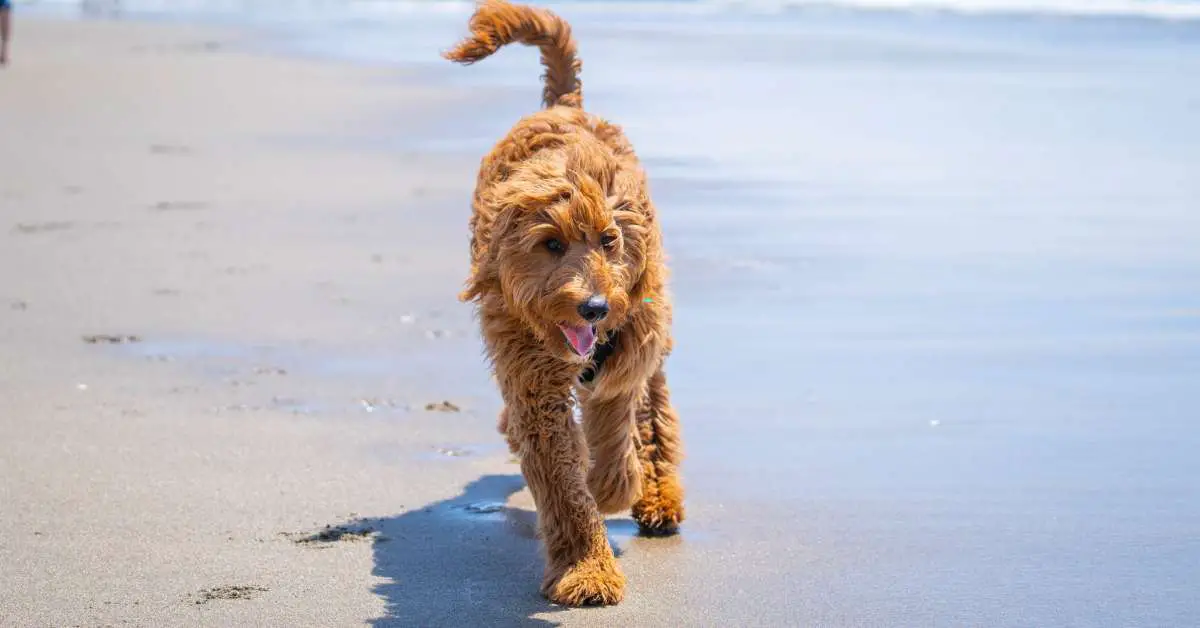
You’re all set for a scenic road trip with your furry companion when, suddenly, disaster strikes – your dog peed in car. Don’t be afraid! This article delves into this common mishap, offering insights, tips, and practical solutions.
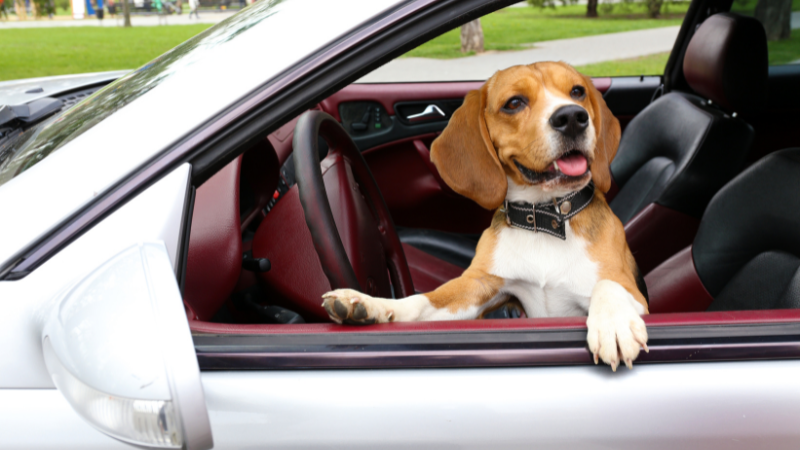
Why Do Dogs Pee in Cars? Comprehending the Drive Behind It
When your four-legged pet decides to mark the car as its own, it’s not the most pleasant surprise you could have hoped for. A variety of factors can explain this behavior. It could be anxiety-related, where unfamiliar surroundings trigger unease.
Your dog may assert dominance in the area by marking their territory with their scent. Sometimes the cause of dog smell (or wet dog smell) is motion sickness, which is analogous to how some people have unpleasant feelings when they are traveling.
Let’s delve into the reasons behind this behavior and explore the various triggers that might be responsible.
Anxiety-related
Anxiety can show itself in various ways in canines when placed in new and possibly stressful situations, like car journeys.
The anticipation of a trip can cause anxiety in some individuals, and the same thing can happen to dogs when they are being transported.
This uneasiness can lead to activities that are not expected, such as urinating while riding in the car. Some dogs may experience anxiety due to the car’s atmosphere, which may cause them to urinate more frequently to alleviate their discomfort due to its restricted area and odd mobility.
As one of the potential dog owners, you can also prevent travel anxiety in dogs using dexmedetomidine hydrochloride oromucosal gel; here, you can study the whole effect of this gel in canines.
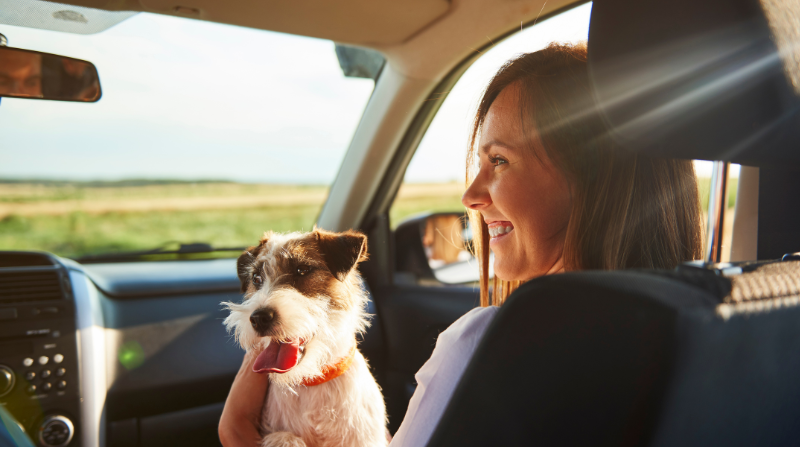
Territory Marking
Dogs are hardwired with a powerful drive to mark their territory, and this activity extends well beyond the areas where they normally spend their time.
When a dog encounters a new environment, such as an automobile, it may need to declare its presence there by leaving its distinctive scent behind.
Dogs communicate their ownership of a space and assert their authority over it by leaving their scent behind in the form of territorial markings. Therefore, if your dog relieves itself in the car, it may assert ownership of the space.
Motion Sickness
Dogs can experience motion sickness much like their human counterparts. Traveling in a vehicle can be disconcerting for animals, particularly those not accustomed to being on the move.
Dogs often urinate when they have motion sickness because it is a bodily reaction to the stress of feeling ill and can contribute to feelings of nausea and pain.
Therefore, if you notice that your dog becomes uneasy whenever you take him or her for a ride in the car, there is a possibility that motion sickness is a component in their accidents.
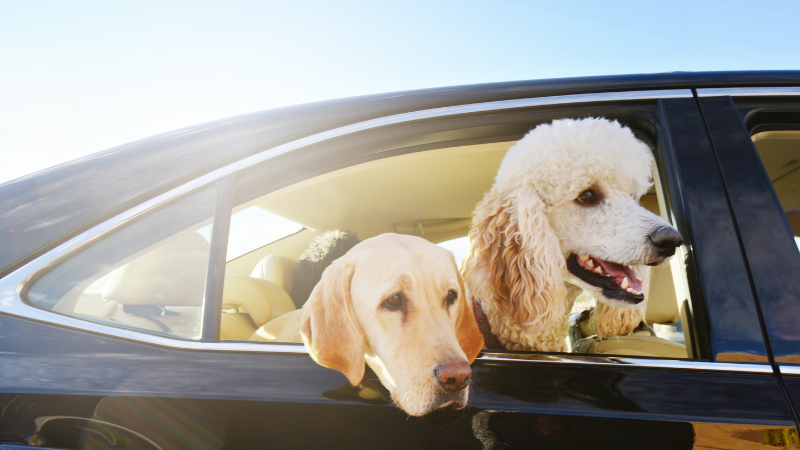
Understanding these triggers helps us empathize with our furry companions and address their needs more effectively.
Whether it be fear, territorial impulses, or motion sickness, knowing the underlying cause can help us find solutions to prevent these mishaps and make car travels a more pleasurable experience for both pets and their owners.
Here you can find the signs of travel-related problems in dogs and their response to treatment with the dog odor-appeasing pheromones.
Dealing with the Unpleasant Reality: Cleanup and Counteraction
Let’s talk about the awful incident of a dog urinating in the car and offer some advice on how to deal with the aftermath in a useful and manageable way.
Whether you’re facing an immediate cleanup or seeking long-term solutions, this information can help you navigate the challenges of accidents on the road.
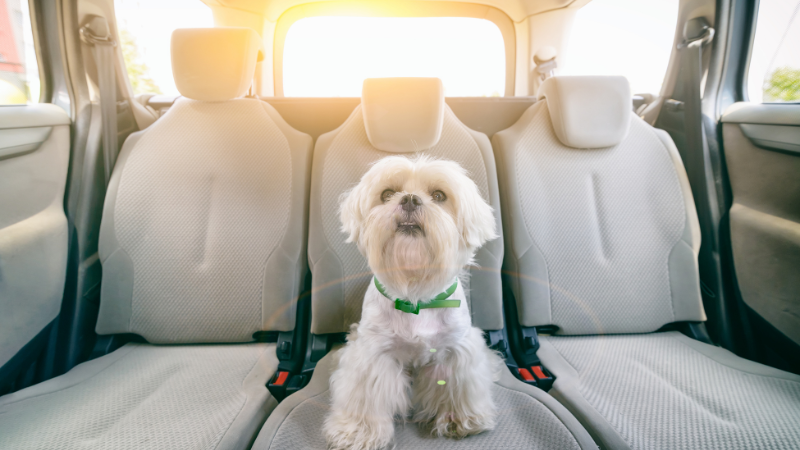
Immediate Actions to Take
Blot, Don’t Rub
It is important to take immediate action in the event of an accident. Instead of rubbing the affected region, use absorbent materials such as paper towels or clean cloths to blot the pee gently.
This stops the liquid from spreading and further soaking into the automobile’s upholstery, or car seat (leather seats or cloth seats), both of which could result in stains and odors that are more difficult to remove.
Neutralize the Odor
Use enzyme-based cleaners that have been specially formulated to degrade urine components to eliminate the pet urine stains’ residual odor.
These cleaners are usually commercially packed in spray bottle. It is because spray bottle keep them safe for a longer time and spray bottle helps in their ease of use. These cleaning solution function at the molecular level, removing, dog hair and bad dog odors.
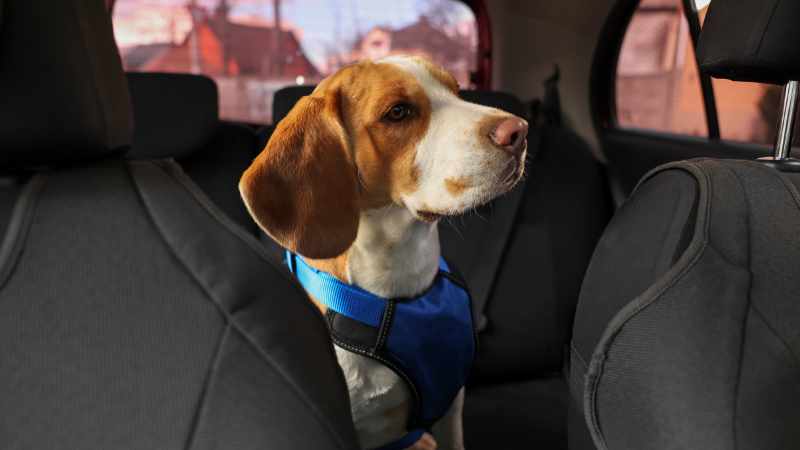
These enzyme-based, cleaners are way better tha steam cleaner, baking soda, or vinegar solution. But in the absence of these specialized solutions than you can use baking soda. It is because baking soda can remove dog hair, clean pet urine, remove dog smells and other unpleasant pet odors. Baking soda can also remove stains from your car fabric seats, But in that case, you must apply baking soda to the car overnight in order to remove tough stains from your car along with dog hair/dog fur and dog smell.
You can lessen the likelihood of your dog having another accident in the same location by eliminating the stench pet urine, making the area less appealing.
Long-term Solutions
Even though dealing with immediate accidents is paramount, concentrating on preventing future accidents is equally important. Consider putting these long-term measures into action to make car rides an experience that is less stressful, more enjoyable, and accident-free for you and your pet companion.
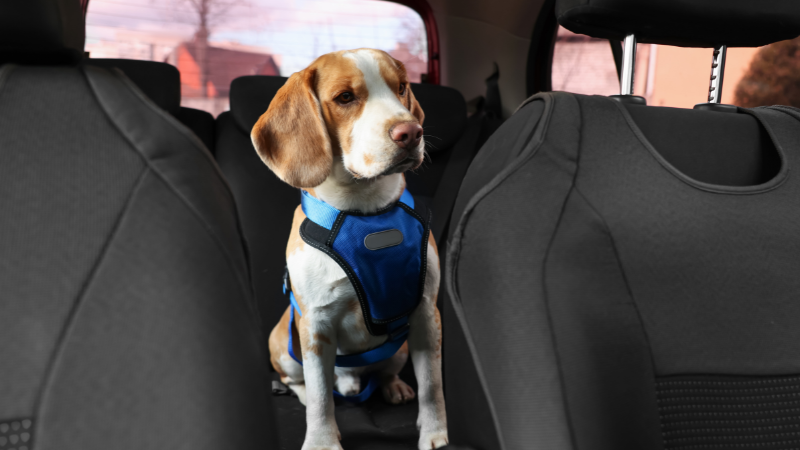
Pre-trip Preparations
It is important to take preventative steps before beginning a trip by car. Reduce the amount of water your dog consumes in the hours leading up to the trip to reduce the number of times you will need to stop for toilet breaks.
Also, you should make sure that pups have the opportunity to use the restroom before getting inside the vehicle. Taking just a few of these easy precautions will cut the risk of getting into an accident during the journey by a significant amount.
Comfort and Familiarity
Make sure your dog has a space in the car that is comfortable and that he is used to. To make them feel more at ease and give them a sense of being protected, put their favorite toy or blanket in the space or car seat that has been set apart for them.
The aroma of familiar objects has been shown to reduce feelings of stress, which can reduce the risk of accidents.
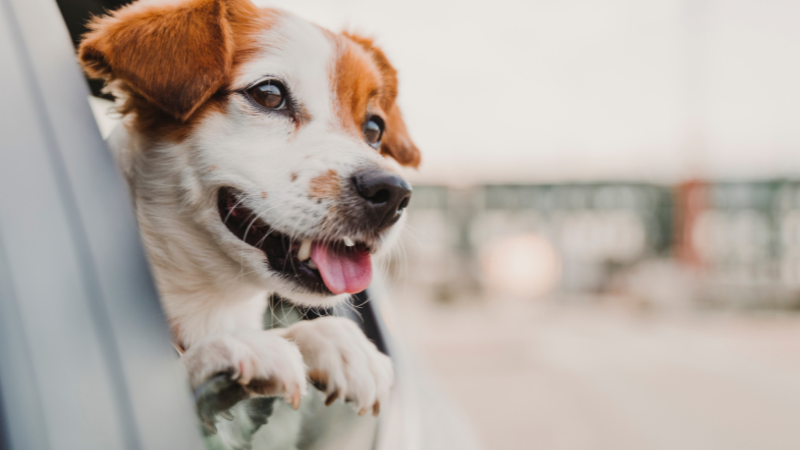
This relatively little effort may go a long way toward establishing a favorable association with travel by automobile.
Comfort and familiarity also keep dogs calm, and they urinate less on car seats/seat covers, and you can not find any dog hair or bad dog odor in cloth car seats.
Frequent Breaks
When traveling for an extended period of time, it is important to remember to plan regular breaks. Aim to pull over every two to three hours, allowing your dog to relieve themselves, stretch their legs, and drink some water.
Your dog will not only have the opportunity to enjoy the trip and investigate its new surroundings during these pauses, but they will also help prevent accidents.
You can properly handle the situation and reduce the likelihood of accidents occurring when traveling with your canine partner in the car if you follow these urgent procedures and execute long-term remedies.
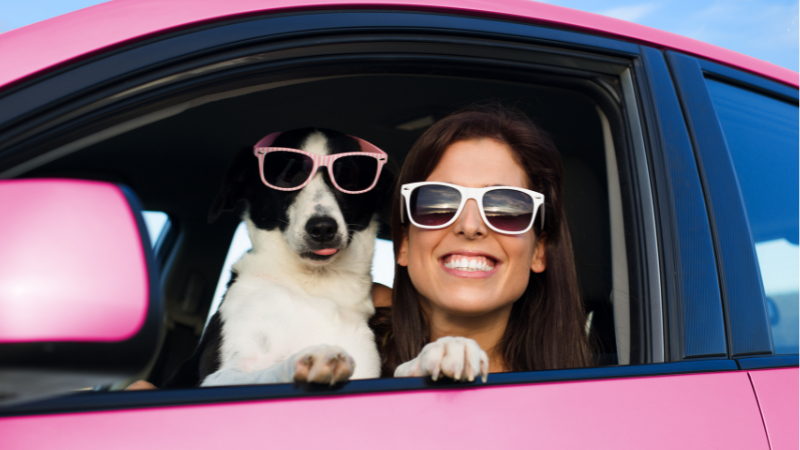
Also, when you want to travel longer distances, try changing your cloth car seats with leather car seats.
Remember that even a small amount of planning and attention may go a long way toward ensuring that your trips with your furry buddy will be safe, fun, and accident-free for both of you.
Also, for safety, keep some baking soda, white vinegar or enzyme-based cleaner to remove dog smell from car seats, car doors or car upholstery in case of an accident.
Comparative Analysis: Comparing Fabric Cloth with Leather
When coping with an unexpected accident involving your dog, your vehicle’s interior can affect how you handle the situation.
Although warm and frequently cheaper, car upholstery made of fabric cloth is notoriously difficult to clean because it readily absorbs liquids.
Even though leather upholstery is smooth and resistant to liquid penetration, it must be handled carefully to avoid damage. In either case, acting quickly is necessary in order to prevent the staining or odor from being permanent.
FAQs
Why is my dog suddenly peeing in the car?
It’s possible that anxiety and fear are to blame for your dog’s sudden urinating problem when riding in the car overnight with you.
Dogs are sensitive to changes in their surroundings, and the fact that a vehicle journey is something they have never experienced before might cause them to become anxious.
They may get overstimulated by the restricted environment, the action, and the unfamiliar odors. As a means of coping with their suffering, your dog may have accidents due to the stress they are experiencing.
What can I do to stop my dog from urinating inside the car?
Consider making some pre-trip preparations to stop your dog from urinating in the car. They should drink less water before the trip so they won’t have to stop as frequently to use the restroom.
You could take them out for a stroll to confirm that they have emptied their bladder. In addition, make sure that the inside of the vehicle is familiar and pleasant.
Putting their favorite things in the car with them will give them a sense of security, which will help reduce their nervousness.
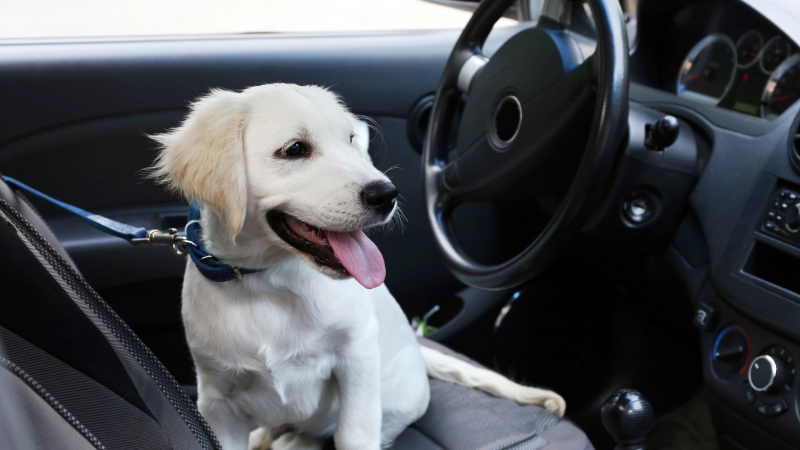
Are certain dog breeds more prone to this behavior?
Dogs have a wide range of possible temperaments, and certain breeds are likelier than others to exhibit behaviors caused by fear, such as eliminating in the car.
Some dog breeds, such as Chihuahuas and Bichon Frise, are noted for having an anxious disposition, and these dogs may find automobile journeys to be particularly unpleasant.
If you are familiar with the breed-specific habits of your dog, you will be better able to meet their requirements when traveling.
Is there a link between motion sickness and peeing in the car?
Dogs can suffer motion sickness in the same way that people can. The sense of movement that one experiences when riding in an automobile might give rise to feelings of sickness and discomfort.
Because of the stress of feeling ill, this bodily uneasiness might result in mishaps as a reaction to the uncomfortable situation. This condition can be partly helped by taking precautions against motion sickness through gradual exposure, brief journeys, and talking with your veterinarian.
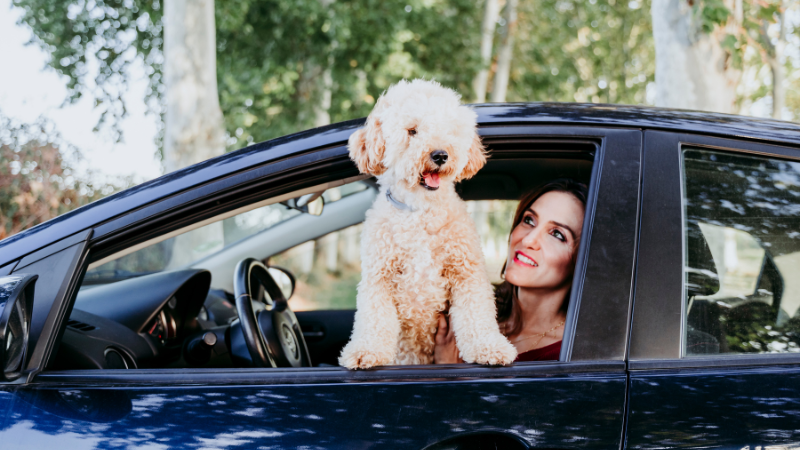
Can I train my dog out of this behavior?
Training can help reduce the number of accidents caused by anxiety. Your dog can become more comfortable with vehicle trips using desensitization techniques, such as gradual exposure to the automobile, positive reinforcement, and desensitization exercises.
However, bear in mind that each dog is different, and in more extreme circumstances, it may be essential to seek the counsel of a behaviorist or a trainer who specializes in canine behavior.
How often should I take a break during car trips with my dog?
When traveling with your dog in the car, it is vital to make frequent stops to maintain the animal’s comfort.
It would help if you made it a point to pull over every two to three hours to allow your dog to stretch, relieve themselves, and rehydrate themselves.
This lowers the likelihood of accidents and enables your four-legged companion to enjoy the trip and become accustomed to its new surroundings.
Can a car seat cover protect my car from accidents?
When traveling with your dog, investing in car seat coverings/seat protector might prove to be a wise decision. They give a further layer of defense to the protection your car’s upholstery receives in an accident.
Seat covers are simple to clean and can prevent urine from leaking inside the vehicle. This makes the cleanup process after an accident much more manageable and helps to keep your leather car seats in good condition.
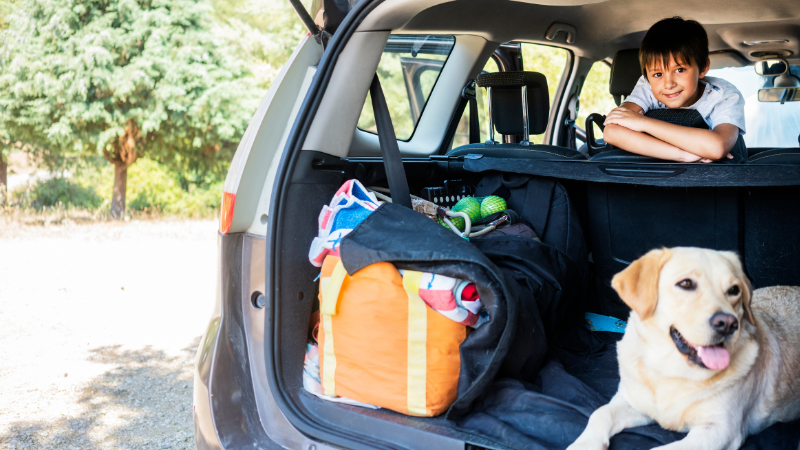
Conclusion
When you start taking trips with your four-legged friend, you must learn about and find a solution to the problem of dogs defecating in vehicles. You may make a difficult circumstance more tolerable by taking preventative action and exhibiting patience.
Remember that the journey ahead is about building memories together and making the most of every moment. Happy travels, accident-free!
